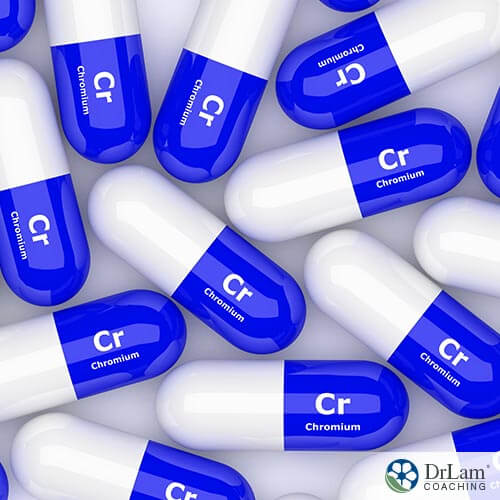
Trivalent chromium carries the label of essential trace element that affects blood sugar levels and increases the work of insulin. Some people take it as a supplement while others get their needed amounts through foods. However, there exists some controversy over whether it actually is essential to the body. And some risks come with its use.
 A mineral that humans need in trace amounts, scientists do not fully understand the mechanisms behind how chromium works. Likewise, the specific amounts needed by the body still elude scientists as well.
A mineral that humans need in trace amounts, scientists do not fully understand the mechanisms behind how chromium works. Likewise, the specific amounts needed by the body still elude scientists as well.
Two primary forms of this mineral exist. Trivalent, or chromium 3+, comes from foods and is biologically active. The toxic form, Hexavalent (chromium 6+) comes from industrial pollution.
Considered essential, a trace element must come from foods you eat since your body can not produce it. Therefore, chromium must come from proper foods or from supplements.
People have long argued that chromium does not play any part in the human body, and some research has not found any benefits. However, there are studies that show chromium does play a significant role in your body. For example, research has indicated that increased levels of chromium affect insulin levels.
The main challenge is that this mineral does not absorb well in the intestines, only about 2.5% of ingested chromium does get absorbed. Another form of this mineral, chromium picolinate, absorbs better and makes up most supplements.
The National Academy of Sciences set out a range of 50 to 200 micrograms per day of chromium as an estimated safe and adequate daily dietary intake for adults and adolescents.
Research indicates a significant effect on insulin by this mineral. In some studies, chromium was found to lower glucose levels and increase sensitivity to insulin. Therefore, it shows a significant benefit to those who suffer from Type 2 diabetes or prediabetes. In addition, other research shows chromium helps with polycystic ovary syndrome (PCOS), a condition linked to insulin resistance.
Studies into the effects of chromium on conditions such as Parkinson’s, risk of heart disease, cholesterol, and weight loss show either contradictory or unclear results.
In addition, some studies suggest this mineral also aids in the metabolism of carbohydrates, fat, and protein.
Other research suggests these benefits may apply mostly to those people who are already deficient in chromium. This condition, only seen rarely, comes from overall poor nutrition.
Several studies involving the use of chromium supplements in people with diabetes show improved blood sugar levels. These studies showed improved sensitivity to insulin and lower blood sugar levels along with a lowered risk of developing diabetes when taking supplements containing chromium.
On the other hand, other studies indicated no improvement in blood sugar levels in people with Type 2 diabetes. In addition, some studies showed no effect on either blood sugar or insulin sensitivity.
So, it appears chromium supplements help some people in some instances but not people overall where blood sugar or insulin resistance played a role.
Several research studies show benefit in reducing hunger and food cravings by taking chromium picolinate. For example, even groups of people with depression and associated binge eating experienced a decrease in these behaviors when taking this mineral supplement.
As a result of these findings regarding depression and binge eating, some benefit in reducing depression can come with this mineral supplement. So, more research should take place before concluding this firmly.
 The effectiveness of this mineral supplement for weight loss remains unclear. One study showed a small amount of weight loss when overweight or obese adults took the supplement and in two other studies, in-depth analyses also concluded that chromium might have played some role in reducing weight.
The effectiveness of this mineral supplement for weight loss remains unclear. One study showed a small amount of weight loss when overweight or obese adults took the supplement and in two other studies, in-depth analyses also concluded that chromium might have played some role in reducing weight.
Your body contains a built-in mechanism for helping you combat the effects of chronic and severe stress. The NEM stress response consists of six circuits composed of three biological organs or organ systems each. These circuits work in an organized, inter-related way to help you handle stress.
The bioenergetics circuit contains the liver, pancreas, and thyroid. Their foremost job in your body consists of providing the energy needed by all the cells in order to function at their best.
However, in times of continuing severe stress, this circuit can become dysfunctional. When this happens, reactive hypoglycemia becomes one of the primary issues that can result.
This type of hypoglycemia may not show up on normal lab tests. So, it is difficult to assess properly. When you also suffer from Adrenal Fatigue Syndrome (AFS), it becomes doubly difficult and doubly troublesome.
When you have AFS, increased stress level results in lowering your cortisol levels and in turn the insulin level goes up. This results in a slower release of glucose causing hypoglycemia. In addition, the increased level of insulin with AFS decreases glucose levels more.
The resulting hypoglycemia works against your body converting food into glucose for fuel. As a result, you may resort to a less efficient way of supplying needed fuel. But burning fat and protein as an energy source requires high cortisol levels to make it work. And with cortisol lowered in AFS, insufficient energy goes to your body.
Your brain is very sensitive to low blood sugar levels. With low levels of blood sugar, your brain stimulates your liver to release stored glucose. However, if this doesn’t work because of the dysfunction of the bioenergetics circuit, it may result in seizures, loss of consciousness, and confusion.
With the potential for chromium and its benefits for controlling blood sugar and insulin resistance, it appears that this essential nutrient could bring relief to those with a dysfunctional bioenergetics circuit. And considering the subclinical hypoglycemia experienced by many with AFS, supplementing with chromium may provide needed help. However, you should consult with your healthcare professional before starting any supplementation.
Most foods contain at least some of this necessary mineral. However, the amounts remain very small. Good sources of this mineral include whole-grain products, meat, and some spices, vegetables, and fruits. On the other hand, sugary foods do not have this mineral.
 Regarding the minimum daily recommendations for dietary consumption of chromium, researchers can only determine approximate amounts. For example, processes used in agriculture and manufacture of the mineral significantly affect the amounts in foods.
Regarding the minimum daily recommendations for dietary consumption of chromium, researchers can only determine approximate amounts. For example, processes used in agriculture and manufacture of the mineral significantly affect the amounts in foods.
For example, the percentage of the daily value for chromium of a half cup of broccoli comes in at thirty-one. This means that much broccoli supplies thirty-one percent of the estimated amount of this mineral considered necessary for a healthy body. On the other hand, one medium unpeeled apple provides only three percent.
In addition to broccoli, potatoes and green beans are good sources of this mineral. Apples and bananas in addition to milk and dairy products are other good sources. Grape juice, mashed potatoes, dried garlic, and orange juice likewise provide trace amounts of this mineral.
One fact to keep in mind regarding chromium involves the amount actually absorbed in your intestines. For instance, only between 0.4% up to 2.5% of ingested chromium absorbs in your gut. The rest becomes excreted from your body in feces.
However, vitamin C and niacin both work to increase the absorption of this mineral into your system. But several things can work to reduce the amount of this mineral in your body. Diets that contain a lot of sugar, infection, pregnancy and lactation, extreme exercise, and stress lead to depletion of stored chromium. So, this makes the stress that causes AFS a major factor in risk for chromium deficiency.
A supplement containing Chromium Chelavite®, a superior chromium-niacin amino acid chelate, Chromaster works with insulin in helping to support healthy blood glucose levels while helping with carbohydrate, fat, and protein utilization.
Research to date shows inconclusive results. Speculation that age may lead to lack of this mineral seems just that at present.
An active area of research involves the use of supplemental chromium with people suffering from Type 2 diabetes and impaired glucose tolerance. Thus far, results from the small studies done in this area prove inconclusive.
It would seem those suffering from AFS who already deal with inadequate nutrition and on-going stress might benefit from supplementation with chromium. Particularly if they experience a dysfunctional bioenergetics circuit.
At this point, no upper limit for this mineral has been established that indicates the point beyond which continuing to ingest the mineral would lead to toxicity. So, this lack can affect the determination of safety for the ingestion of chromium supplements.
Because chromium picolinate makes up the most popular form of supplement for this mineral, the lack of an upper limit causes concern. Harmful hydroxyl radicals may for with high levels of this supplement. This could lead to genetic damage. High levels of the supplement could range between 1200 and 2400 micrograms per day.
Not only are there safety concerns about chromium, but there are also some risks of drug interactions with this mineral. You should be careful about chromium supplementation if you take other drugs like NSAIDS and beta-blockers.
These adverse effects appear to occur rarely. However, combined with safety concerns and the lack of reporting of adverse effects in studies scientists do not recommend the use of chromium picolinate as a dietary supplement.
It is not clear from scientific studies if chromium supplements play any part in improving lipid metabolism. It is probably because these studies did not keep the other dietary factors that affect lipid metabolism as constant, therefore giving mixed results. Additionally, the scientists could not determine the initial levels of this mineral in the subjects’ bodies to measure the difference.
Antacids, H2 blockers, proton pump inhibitors, and corticosteroids may work to impair the absorption of chromium due to their influence on stomach acidity.
Nicotinic acid, NSAIDS, insulin, beta-blockers, corticosteroids, and prostaglandin inhibitors may increase the absorption of chromium and experience an increase in their effects if taken with chromium.
Some reports of irregular heartbeat, headaches, sleeplessness, mood swings, and allergic reactions show up in the literature. If you suffer from kidney or liver damage, taking these supplements may increase this damage. So, for that reason, you should consult your healthcare professional before taking this supplement.
If you are pregnant or breastfeed, you should refrain from taking chromium as a supplement. If you plan to give these supplements to children, please consult your healthcare professional first.
Some medical experts recommend taking no more than 200 micrograms per day without medical supervision.
A lot of conflicting research lies behind the use of chromium and even its necessity as an essential mineral. But even with this conflict, sufficient evidence shows great benefit if you experience blood sugar problems.
This mineral appears to increase insulin sensitivity and decrease glucose levels. This would make it particularly effective in cases of hyperglycemia.
People suffering from AFS may experience hypoglycemia as a result of their condition. Supplementation may prove beneficial for them.
Some studies indicate beneficial effects from this mineral when taken to curb hunger and cravings for particular foods.
Very small amounts of weight loss were reported in a few studies when this mineral was taken.
It can come from food sources or from supplementation. Absorption into your body remains very small compared to the amount ingested.
Some concerns regarding the safety of this mineral as a supplement should be taken into consideration before using it.
If you plan to increase your intake of chromium, here are a few things you can do:
 Eat more of those foods that naturally contain the mineral.
Eat more of those foods that naturally contain the mineral.Whatever course of action you decide to take, however, please do so with the guidance of your healthcare professional who can assess your needs and help you explore options.
If you would like to know more about or need assistance with taking chromium supplements, contact the team at Dr. Lam Coaching. We offer a free** no-obligation phone consultation at +1 (626) 571-1234 where we will privately discuss your symptoms and various options. You can also send us a question through our Ask The Doctor system by clicking here.
Some research indicates chromium to be useful as a way to control blood sugar and insulin sensitivity. While chromium is found in many foods, the amount absorbed into the body remains very low. Supplementation may be necessary, especially if you are deficient in this mineral.
